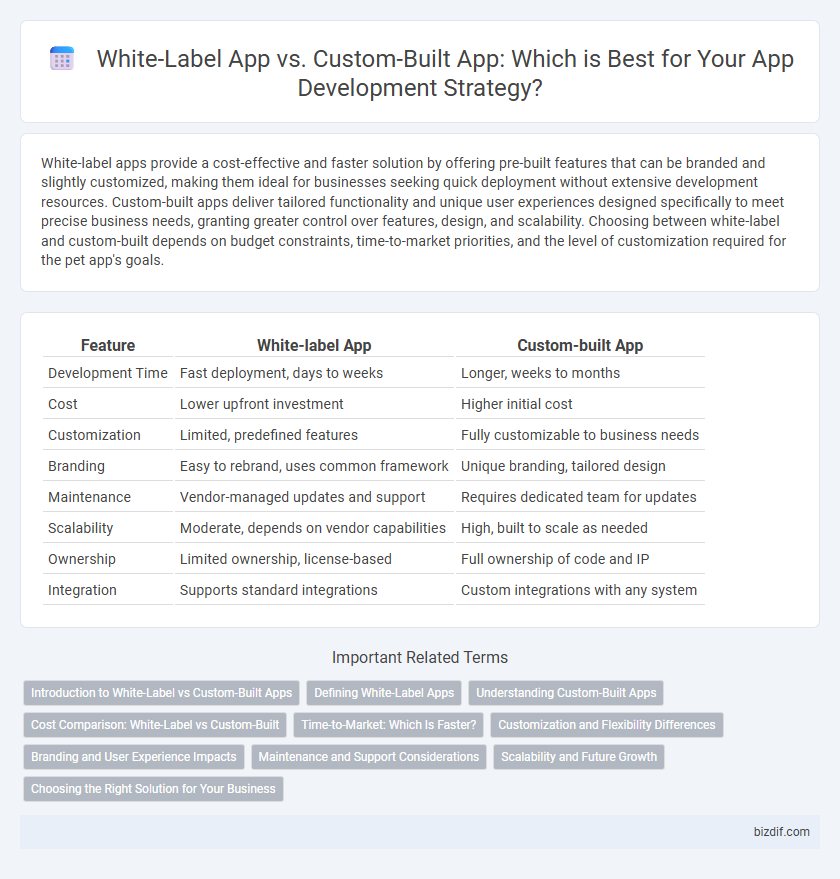White-label apps provide a cost-effective and faster solution by offering pre-built features that can be branded and slightly customized, making them ideal for businesses seeking quick deployment without extensive development resources. Custom-built apps deliver tailored functionality and unique user experiences designed specifically to meet precise business needs, granting greater control over features, design, and scalability. Choosing between white-label and custom-built depends on budget constraints, time-to-market priorities, and the level of customization required for the pet app's goals.
Table of Comparison
| Feature | White-label App | Custom-built App |
|---|---|---|
| Development Time | Fast deployment, days to weeks | Longer, weeks to months |
| Cost | Lower upfront investment | Higher initial cost |
| Customization | Limited, predefined features | Fully customizable to business needs |
| Branding | Easy to rebrand, uses common framework | Unique branding, tailored design |
| Maintenance | Vendor-managed updates and support | Requires dedicated team for updates |
| Scalability | Moderate, depends on vendor capabilities | High, built to scale as needed |
| Ownership | Limited ownership, license-based | Full ownership of code and IP |
| Integration | Supports standard integrations | Custom integrations with any system |
Introduction to White-Label vs Custom-Built Apps
White-label apps offer pre-designed, easily customizable solutions that reduce development time and costs, ideal for businesses seeking quick market entry. Custom-built apps provide tailored features and unique user experiences, developed from scratch to meet specific business requirements and scalability needs. Choosing between white-label and custom-built apps depends on budget constraints, time-to-market urgency, and the necessity for exclusive functionalities.
Defining White-Label Apps
White-label apps are pre-built software solutions designed for multiple businesses to rebrand and customize with minimal development effort, allowing rapid deployment at a lower cost compared to custom-built apps. These apps offer standard features and templates tailored to various industries, ensuring consistent functionality while providing branding flexibility. Businesses choose white-label apps to accelerate time-to-market and reduce technical complexity without sacrificing essential user experience.
Understanding Custom-Built Apps
Custom-built apps are tailored specifically to meet unique business requirements, offering greater flexibility and scalability compared to white-label solutions. These applications integrate proprietary features and customized user experiences that align directly with organizational goals and workflows. Investing in a custom-built app ensures comprehensive control over design, functionality, and future enhancements critical for competitive advantage in app development.
Cost Comparison: White-Label vs Custom-Built
White-label apps offer a cost-effective solution with lower upfront expenses and quicker deployment compared to custom-built apps, which require higher initial investment due to tailored design and development. Custom-built apps incur ongoing costs tied to maintenance, updates, and scalability, whereas white-label solutions often include these in subscription fees. Businesses must weigh budget constraints against the need for unique features and scalability when choosing between white-label and custom-built app development.
Time-to-Market: Which Is Faster?
White-label apps offer significantly faster time-to-market compared to custom-built apps due to their pre-developed frameworks and ready-to-deploy features. Custom-built apps require extensive design, development, and testing phases, often extending launch timelines by several months. Businesses prioritizing rapid deployment typically prefer white-label solutions for efficient market entry without extensive coding from scratch.
Customization and Flexibility Differences
Custom-built apps offer unparalleled customization and flexibility by allowing developers to tailor every feature and interface element to exact business requirements, ensuring a unique user experience. White-label apps provide limited customization options, primarily confined to branding elements such as logos and color schemes, which restricts the ability to modify core functionalities. Businesses seeking full control over app behavior and integration with proprietary systems benefit significantly from the bespoke nature of custom-built solutions.
Branding and User Experience Impacts
White-label apps offer quick deployment with pre-designed branding options, enabling businesses to maintain consistent brand presence but limiting deep customization of user experience. Custom-built apps provide complete control over branding elements and interface design, allowing for unique, tailored experiences that align closely with specific user needs and company identity. The choice significantly impacts how users perceive the app, influencing engagement, loyalty, and overall brand differentiation in competitive markets.
Maintenance and Support Considerations
White-label apps offer streamlined maintenance and support due to standardized features and vendor-managed updates, reducing downtime and technical overhead. Custom-built apps require dedicated development teams to handle ongoing maintenance, which can increase costs but allows tailored support aligned with specific business needs. Choosing between the two depends on balancing scalability, control, and budget for long-term app sustainability.
Scalability and Future Growth
White-label apps offer quick deployment with limited scalability, often constraining future growth due to standardized features and architecture. Custom-built apps provide tailored scalability, enabling businesses to adapt and expand functionalities seamlessly as user demands evolve. Investing in custom solutions ensures long-term flexibility and supports complex integrations essential for sustained growth.
Choosing the Right Solution for Your Business
Choosing between a white-label app and a custom-built app hinges on budget, timeline, and unique business requirements. White-label apps offer rapid deployment and cost-efficiency with pre-designed features, ideal for standardized solutions, while custom-built apps provide tailored functionality and scalability to meet specific business goals. Evaluating factors like user experience, integration capabilities, and long-term maintenance helps businesses select the optimal app development approach aligned with growth strategies.
White-label app vs Custom-built app Infographic

 bizdif.com
bizdif.com